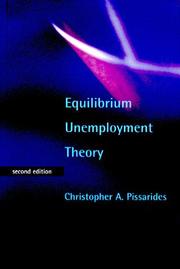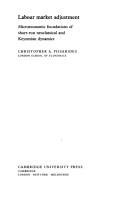| Listing 1 - 10 of 23 | << page >> |
Sort by
|

ISBN: 0262161877 9780262161879 9786612100079 1282100076 0262281643 0585238413 Year: 2000 Publisher: Cambridge, Mass. MIT
Abstract | Keywords | Export | Availability | Bookmark
 Loading...
Loading...Choose an application
- Reference Manager
- EndNote
- RefWorks (Direct export to RefWorks)
Labour market --- Unemployment --- Equilibrium (Economics) --- Mathematical models --- -Equilibrium (Economics) --- 331.137 --- Disequilibrium (Economics) --- Economic equilibrium --- General equilibrium (Economics) --- Partial equilibrium (Economics) --- Economics --- Stagnation (Economics) --- Statics and dynamics (Social sciences) --- Joblessness --- Employment (Economic theory) --- Full employment policies --- Labor supply --- Manpower policy --- Right to labor --- Underemployment --- Mathematical models. --- Equilibrium (Economics). --- Unemployment - Mathematical models
Book
ISBN: 063115213X 9780631152132 Year: 1990 Publisher: Oxford Blackwell
Abstract | Keywords | Export | Availability | Bookmark
 Loading...
Loading...Choose an application
- Reference Manager
- EndNote
- RefWorks (Direct export to RefWorks)
Labour market --- Unemployment --- Equilibrium (Economics) --- Mathematical models --- 331.56 --- 330.1 --- -AA / International- internationaal --- 305.94 --- 332.630 --- Joblessness --- Employment (Economic theory) --- Full employment policies --- Labor supply --- Manpower policy --- Right to labor --- Underemployment --- Disequilibrium (Economics) --- Economic equilibrium --- General equilibrium (Economics) --- Partial equilibrium (Economics) --- Economics --- Stagnation (Economics) --- Statics and dynamics (Social sciences) --- Werkloosheid. Arbeidsreserve --- Economische grondbegrippen. Algemene begrippen in de economie --- Econometrie van de arbeidsmarkt, de werkgelegenheid en de werkloosheid. --- Strijd tegen de werkloosheid: algemeen. Theorie en beleid van de werkgelegenheid. Volledige werkgelegenheid. --- Mathematical models. --- Equilibrium (Economics). --- 330.1 Economische grondbegrippen. Algemene begrippen in de economie --- 331.56 Werkloosheid. Arbeidsreserve --- AA / International- internationaal --- DGE (Economics) --- DSGE (Economics) --- Dynamic stochastic general equilibrium (Economics) --- SDGE (Economic theory) --- Econometrie van de arbeidsmarkt, de werkgelegenheid en de werkloosheid --- Strijd tegen de werkloosheid: algemeen. Theorie en beleid van de werkgelegenheid. Volledige werkgelegenheid --- Unemployment - Mathematical models

ISBN: 052121064X 9780521210645 Year: 1976 Publisher: Cambridge
Abstract | Keywords | Export | Availability | Bookmark
 Loading...
Loading...Choose an application
- Reference Manager
- EndNote
- RefWorks (Direct export to RefWorks)
Labour market --- Labour economics --- Keynes, John Maynard --- Labor supply --- Mathematical models --- 331.5 --- -AA / International- internationaal --- 332.691 --- Labor force --- Labor force participation --- Labor pool --- Work force --- Workforce --- Labor market --- Human capital --- Labor mobility --- Manpower --- Manpower policy --- Arbeidsmarkt. Werkgelegenheid --(algemeen) --- Evolutie van de arbeidsmarkt. --- Mathematical models. --- 331.5 Arbeidsmarkt. Werkgelegenheid --(algemeen) --- AA / International- internationaal --- Evolutie van de arbeidsmarkt --- Labor supply - Mathematical models
Book
Year: 1988 Publisher: London
Abstract | Keywords | Export | Availability | Bookmark
 Loading...
Loading...Choose an application
- Reference Manager
- EndNote
- RefWorks (Direct export to RefWorks)
Book
Year: 1984 Publisher: London
Abstract | Keywords | Export | Availability | Bookmark
 Loading...
Loading...Choose an application
- Reference Manager
- EndNote
- RefWorks (Direct export to RefWorks)
Book
Year: 1984 Publisher: London
Abstract | Keywords | Export | Availability | Bookmark
 Loading...
Loading...Choose an application
- Reference Manager
- EndNote
- RefWorks (Direct export to RefWorks)
Digital
ISBN: 0753019205 Year: 2001 Publisher: London Centre for Economic Performance
Abstract | Keywords | Export | Availability | Bookmark
 Loading...
Loading...Choose an application
- Reference Manager
- EndNote
- RefWorks (Direct export to RefWorks)
Digital
Year: 2003 Publisher: Munich CESifo
Abstract | Keywords | Export | Availability | Bookmark
 Loading...
Loading...Choose an application
- Reference Manager
- EndNote
- RefWorks (Direct export to RefWorks)
Article
Year: 2000 Publisher: Paris : OECD Publishing,
Abstract | Keywords | Export | Availability | Bookmark
 Loading...
Loading...Choose an application
- Reference Manager
- EndNote
- RefWorks (Direct export to RefWorks)
The main policy implication that emerges from this study is that subsidised education without at the same time provision for the creation of growth-enhancing jobs can be good for the individual but bad for growth (and presumably public finances). There is evidence of very high private returns to education, in the form of higher wages for degree holders, but also evidence that these returns are not always matched by social returns in the form of higher output. Governments need to ensure that educated men and women have incentives to work in occupations that contribute to social welfare. Admittedly, some of those occupations, such as the running of social services or the looking after of sick people, do not show up in growth statistics. But they are as valuable as those that do ...
Article
Year: 2000 Publisher: Paris : OECD Publishing,
Abstract | Keywords | Export | Availability | Bookmark
 Loading...
Loading...Choose an application
- Reference Manager
- EndNote
- RefWorks (Direct export to RefWorks)
The main policy implication that emerges from this study is that subsidised education without at the same time provision for the creation of growth-enhancing jobs can be good for the individual but bad for growth (and presumably public finances). There is evidence of very high private returns to education, in the form of higher wages for degree holders, but also evidence that these returns are not always matched by social returns in the form of higher output. Governments need to ensure that educated men and women have incentives to work in occupations that contribute to social welfare. Admittedly, some of those occupations, such as the running of social services or the looking after of sick people, do not show up in growth statistics. But they are as valuable as those that do ...
| Listing 1 - 10 of 23 | << page >> |
Sort by
|

 Search
Search Feedback
Feedback About UniCat
About UniCat  Help
Help News
News